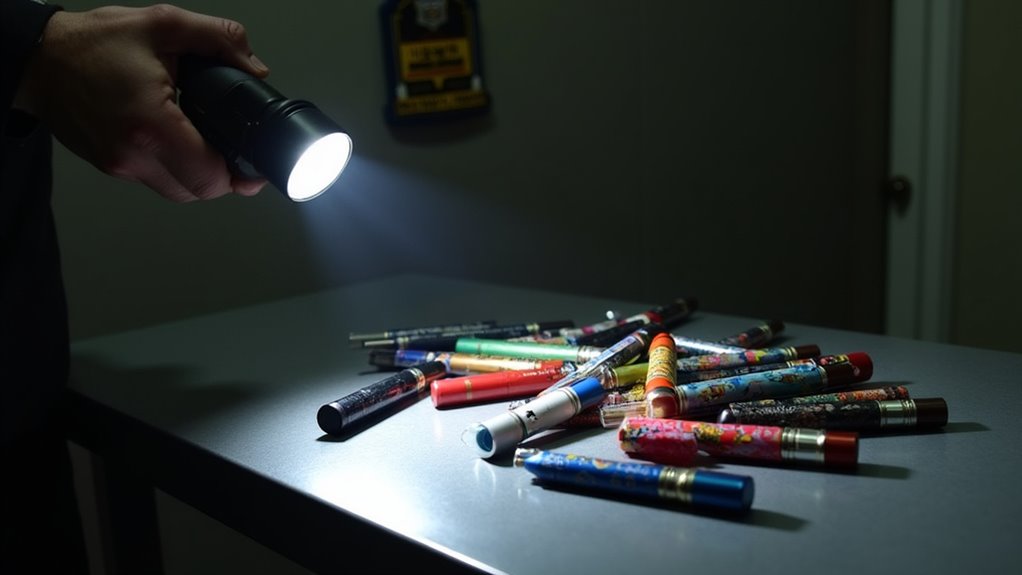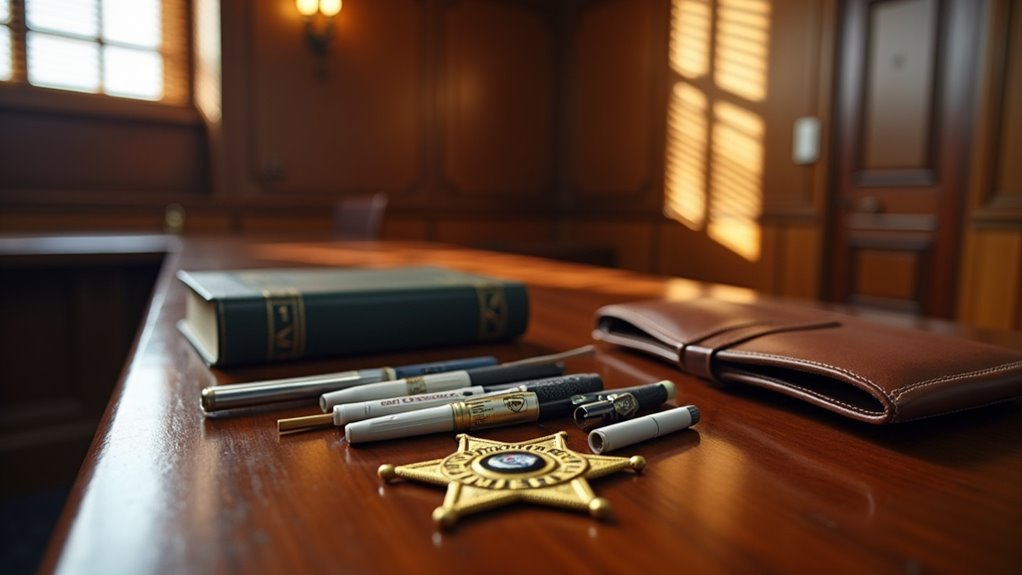Paulding County’s “Operation Clean Air” has resulted in seven arrests for illegal vape sales to minors, showing you the serious consequences of violating Georgia’s strict vaping laws. If you’re caught selling vaping products to anyone under 21, you’ll face misdemeanor charges, fines up to $1,000, and mandatory community service. You should understand your legal rights and obligations, as authorities continue targeting both sellers and users in their efforts to combat youth nicotine addiction. Learn more about protecting yourself and your business below.
Recent Arrests Highlight Growing Teen Vaping Crisis

A sweeping law enforcement operation in Paulding County has resulted in seven arrests linked to the illegal sale of vaping products to minors, underscoring the region’s mounting struggle with youth nicotine addiction.
The Paulding County Sheriff’s Office launched “Operation Clean Air” in response to alarming reports from local schools about record-high vape confiscations. This initiative aims to strengthen regulatory oversight and protect students from nicotine dependency.
You’ll find public health initiatives are now targeting both sellers and users, as authorities work to combat this growing crisis. The arrests serve as a stark reminder that law enforcement won’t tolerate vendors who jeopardize youth health through illegal sales.
Understanding Georgia’s Vaping Laws and Regulations
Under Georgia’s OCGA Section 16-12-171, the sale or distribution of vaping products to anyone under 21 is strictly prohibited, with violations carrying serious legal consequences. You’ll face misdemeanor charges, fines ranging from $300 to $1,000, and mandatory community service if caught selling these products to minors.
Current regulatory enforcement trends show increased scrutiny of vape retailers, while public health initiatives focus on prevention and education. If you’re caught violating these laws, you might face driving privilege suspension for repeat offenses. The state’s strict stance aligns with nationwide efforts to combat the youth vaping epidemic through enforcement and deterrence.
Legal Consequences for Selling Vapes to Minors

Selling vapes to minors can land you in serious legal trouble, with consequences that extend beyond simple fines. Under Georgia law, you’ll face misdemeanor charges, potential fines ranging from $300 to over $1,000, and mandatory community service of at least 20 hours.
Prosecutors’ strategies often focus on repeat offenders and those who deliberately target young people. The community impacts of these violations have led to stricter enforcement, especially in Paulding County where “Operation Clean Air” targets violators. You’ll need an attorney to navigate possible defenses or negotiate reduced penalties, as these charges can’t be dismissed without legal representation.
Building a Strong Defense Against Vaping Charges
When facing vaping-related charges in Paulding County, building an effective defense requires understanding multiple legal strategies and options. You’ll need to ponder minor’s affirmative defenses, such as proving proper age verification attempts or demonstrating the use of fake identification. Your attorney can help in challenging regulatory ambiguities and examining whether law enforcement followed proper procedures.
Key defense strategies include questioning evidence integrity, documenting compliance efforts, and exploring potential constitutional violations. You may also benefit from demonstrating proactive steps taken to prevent underage sales, including staff training records and implementation of strict ID checking protocols. Early intervention with legal counsel often leads to better outcomes.
Impact of Legal Representation on Case Outcomes

Legal representation substantially impacts the outcome of vaping-related charges in Paulding County, with stark differences between represented and unrepresented cases. When you work with an attorney, you’ll gain access to alternative resolution options that align with community education programs and public health initiatives. Your lawyer can navigate complex legal requirements while protecting your rights.
Skilled legal representation opens doors to alternative resolutions and education programs, turning vaping charges into opportunities for positive change.
- Represented cases often result in reduced charges or dismissals through diversion programs
- Unrepresented defendants typically face standard penalties without access to alternative resolutions
- Legal counsel can help integrate case outcomes with public health initiatives focused on prevention
Your choice of representation directly influences whether your case becomes an opportunity for rehabilitation rather than punishment.
Frequently Asked Questions
How Can Schools Legally Confiscate and Dispose of Vaping Devices?
You can legally confiscate vaping devices through established school policies that clearly outline prohibited items and consequences. Your school should implement random drug testing policies and vaping education programs to support these efforts. When you find devices, document the incident, secure them in designated storage, and dispose of them through proper channels like local law enforcement or hazardous waste facilities. Always follow your district’s protocols for handling and disposing of confiscated items.
Can Parents Be Held Liable if Their Child Shares Vapes With Friends?
Think of parental liability like a double-edged sword: you’re responsible both legally and morally. Yes, you can be held liable if your child distributes vapes to other minors, as this violates OCGA Section 16-12-171. To protect yourself and your teen, it’s indispensable to implement strong parental monitoring strategies and participate in community-based education programs. You’ll want to have regular conversations about vaping risks and maintain awareness of your child’s activities and possessions.
What Happens to Confiscated Vaping Products After Law Enforcement Seizures?
When law enforcement seizes vaping products, they’ll follow strict chain of custody procedures to maintain evidence integrity. You’ll find that these items are typically logged, photographed, and stored in secure evidence rooms. After cases are resolved, most departments follow specific destruction protocols they’ll properly dispose of the products following environmental guidelines. They won’t resell or redistribute these items, as that would create health and liability risks for the department.
Are There Different Penalties for Selling Nicotine-Free Versus Nicotine-Containing Vapes?
Under Georgia’s vapor composition regulations, you’ll face the same penalties for selling any vaping devices to minors, regardless of nicotine content. Device maturity restrictions apply identically to all vaping products because they’re considered tobacco-related items under OCGA 16-12-171. You can’t avoid penalties by claiming the product was nicotine-free, as the law focuses on the device itself rather than its contents to protect youth from potential harm.
Do Smoke Shops Face Additional Licensing Restrictions After Underage Sales Violations?
Like walking on thin ice, your smoke shop’s future hangs in the balance after juvenile sales violations. You’ll face heightened scrutiny with increased compliance inspections and mandatory employee training requirements. Your business license could be suspended or revoked, especially for repeat violations. You’ll need to demonstrate improved age verification procedures and may face more frequent random checks. The key to staying open is maintaining strict compliance with all minority-restriction laws.

